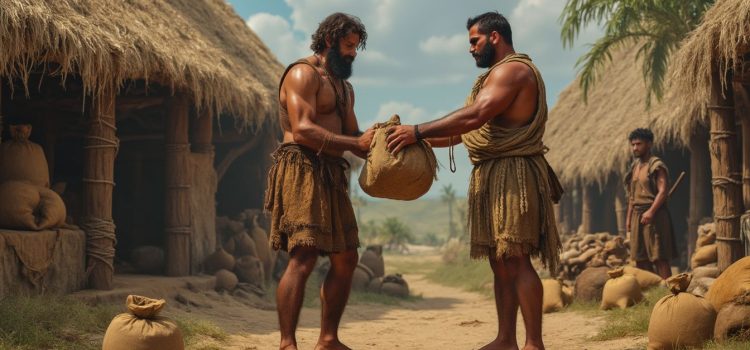
What drives our understanding of right and wrong? How did humans develop their moral systems?
In Darwin’s Dangerous Idea, Daniel Dennett explores the connection between evolution and morality. He asserts that, from basic reciprocity in early human societies to complex moral frameworks, our ethical systems have evolved through cultural transmission and social learning.
Keep reading to discover how simple acts of sharing and cooperation have shaped the moral principles we live by today.
Evolution and Morality
Dennett writes that, just as culture can be understood as an evolution of memes, so can morality: Our understanding of right and wrong, ethics, and altruism aren’t divine gifts but are instead transmitted culturally. We learn these behaviors from those around us, absorbing them as part of our cultural upbringing.
Dennett discusses the link between evolution and morality, arguing that an evolutionary or memetic explanation for our moral systems can be traced back to reciprocity: the practice of exchanging actions, goods, or services with others for mutual benefit. It’s a fundamental social behavior where individuals cooperate and help each other with the expectation that such actions will be returned in kind.
In early human societies, reciprocity might have manifested in the sharing of food after a successful hunt. For example, a skilled hunter who brought down a large animal would share the meat with others in the group, knowing that when he failed to catch prey in the future, those same individuals would share their own successful hunts with him. This mutual exchange ensured a more consistent food supply for everyone, increasing the entire group’s chances of survival.
(Shortform note: In Influence, psychologist Robert Cialdini writes that, unfortunately, our instinct for reciprocity represents a blind spot that advertisers, marketers, salespeople, politicians, and other people looking to influence your behavior know how to exploit. According to Cialdini, these figures know you’re more likely to feel obliged to them if they offer you some small gift or token gesture of kindness before they make their request. This is why sellers are so fond of promotional offers, free samples, and small gifts: They hope that by accepting these offers, you’ll feel indebted to them and that you’ll fulfill your social obligation by purchasing their product.)
From this foundation of mutual exchange and benefit, more intricate moral concepts like fairness, trust, and cooperation gradually emerged. Dennett posits that successful moral ideas formed memes that spread and evolved within cultures much like genes do in biological evolution. He further writes that this perspective helps explain the diversity of moral systems across different cultures, as these ideas would have evolved differently in varying cultural contexts—just as, as we’ve explored, environmental pressures in the physical environment influence which genetic mutations survive and which don’t.
(Shortform note: Moral relativism holds that each culture has its own uniquely nuanced moral code due to the diversity of cultural contexts Dennett observes. However, anthropologists agree with Dennett that the evolutionary need for reciprocity is the basis of all moral systems. They argue further that there are seven universally accepted moral values: willingness to help your family, willingness to help your group, willingness to return favors, bravery, obedience to superiors, fairness, and respect of others’ property. All of these are rooted in reciprocity.)






